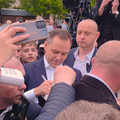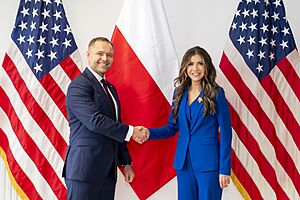Karol Nawrocki facts for kids
Quick facts for kids
Karol Nawrocki
|
|
|---|---|
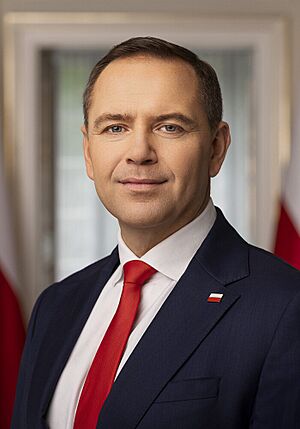
Official portrait, 2025
|
|
| President of Poland | |
| Assumed office 6 August 2025 |
|
| Prime Minister | Donald Tusk |
| Preceded by | Andrzej Duda |
| President of the Institute of National Remembrance | |
| In office 23 July 2021 – 6 August 2025 |
|
| Preceded by | Jarosław Szarek |
| Director of the Museum of the Second World War | |
| In office 19 October 2017 – 23 July 2021 |
|
| Preceded by | Paweł Machcewicz |
| Succeeded by | Grzegorz Berendt |
| Personal details | |
| Born |
Karol Tadeusz Nawrocki
3 March 1983 Gdańsk, Poland |
| Political party | Independent |
| Other political affiliations |
Law and Justice (2025) |
| Spouse |
Marta Smoleń
(m. 2010) |
| Children | 3 |
| Residence | Belweder |
| Education | University of Gdańsk (PhD) Gdańsk University of Technology (MBA) |
| Occupation | |
| Awards | |
Karol Tadeusz Nawrocki (born March 3, 1983) is a Polish historian and politician who is the seventh President of Poland. He took office in 2025.
Before becoming president, he was the head of the Institute of National Remembrance, an organization that teaches about Poland's history. He was also the director of the Museum of the Second World War in Gdańsk.
Nawrocki was born in Gdańsk. He studied history at the University of Gdańsk and earned a doctorate degree. His studies focused on Poland's history, especially the country's fight for freedom. He was also a talented young athlete who played football and boxed.
In the 2025 Polish presidential election, he ran as an independent candidate with support from the Law and Justice party. He won the election and became president on August 6, 2025. As president, he focuses on national identity and history. Many people who voted for him like his conservative and traditional views.
Contents
Early Life and Schooling
Karol Nawrocki was born on March 3, 1983, in Gdańsk, Poland. His father, Ryszard, was a factory worker and a member of the Solidarity movement, which helped bring freedom to Poland. His mother, Elżbieta, was a bookbinder. He has a younger sister named Nina.
He went to primary and high school in Gdańsk. After graduating in 2002, he studied business administration. In 2003, he started studying history at the University of Gdańsk. He earned his master's degree in 2008.
Later, he earned a PhD in history. His research was about how people in the Elbląg region resisted the communist government between 1976 and 1989. In 2023, he also completed business studies at the Gdańsk University of Technology.
Career Before Presidency
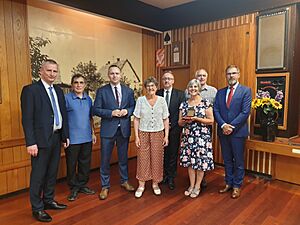
From 2009 to 2017, Karol Nawrocki worked at the Institute of National Remembrance (IPN). This is an important Polish institution that researches and teaches about the country's recent history. From 2013, he led its public education office in Gdańsk.
In 2017, he became the director of the Museum of the Second World War in Gdańsk. He led the museum until 2021. After that, he returned to the IPN and became its president.
Nawrocki has written or co-written several books and articles. His work often focuses on the history of sports, Poland's fight against communism, and the country's past.
Becoming President in 2025
In November 2024, Karol Nawrocki was announced as a candidate for president. He ran as an independent but was supported by the Law and Justice party.
The election had two rounds. In the first round on May 18, 2025, he came in second place. This meant he went to a second round of voting against Rafał Trzaskowski.
During his campaign, Nawrocki met with U.S. President Donald Trump. On June 1, 2025, Nawrocki won the final round of the election with 50.9% of the vote. His campaign focused on patriotism, Christian values, and strong relationships with NATO and the West.
-
Nawrocki in Bielsko-Biała on 2 December
-
Nawrocki in Płock on 7 May
-
Nawrocki in Bydgoszcz on 19 May
Presidency (2025–present)
Nawrocki officially became the president of Poland on August 6, 2025. In his first speech, he said he wanted to make changes to the Constitution of Poland. Soon after, he was invited to the White House to meet with U.S. President Donald Trump.
On his first days in office, President Nawrocki signed proposals for new laws. One would remove a tax for families with more than one child. Another would stop the sale of Polish land to foreigners for a longer time.
The President's Team
Chancellery of the President of the Republic of Poland |
|
| President | Karol Nawrocki |
|---|---|
| Managers of the Chancellery of the President of the Republic of Poland | |
| Chief of the Chancellery | Zbigniew Bogucki |
| SOS – Deputy of the Chief of the Chancellery | Adam Andruszkiewicz |
| SOS – Chief of the Cabinet of the President | Paweł Szefernaker |
| SOS in the BBN – Chief of the BBN | Sławomir Cenckiewicz |
| SOS – Chief of the Bureau of International Policy | Marcin Przydacz |
| SOS | Wojciech Kolarski |
| USOS – Deputy of the Chief of the Cabinet | Jarosław Dębowski |
| USOS | Agnieszka Jędrzak |
| USOS | Mateusz Kotecki |
| USOS – Press Spokesperson of the President | Rafał Leśkiewicz |
| USOS | Karol Rabenda |
| General Director of the Chancellery of the President | Magdalena Głowa |
On August 7, President Nawrocki chose the people who would work closely with him in the President's Chancellery. This is the office that helps the president do his job.
His team includes people he worked with at the Institute of National Remembrance. It also includes experienced politicians from the Law and Justice party.
His Main Ideas and Beliefs
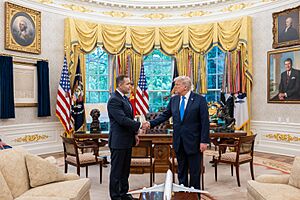
Karol Nawrocki is seen as a conservative leader, even though he does not belong to any political party. He calls himself a "representative of the patriotic camp" and a "civic candidate" who wants to unite the country.
Social and Cultural Ideas
Nawrocki is a Catholic and has culturally conservative views. He believes in promoting Polish patriotism, Christian values, and traditional family life. He has said it is important to defend these values and has spoken against removing religious symbols from public buildings.
He holds strong anti-communist views. He has praised the "cursed soldiers," who fought against the communist government after World War II, as Polish heroes. Because of his work removing old Soviet monuments in Poland, the Russian government has expressed its disapproval.
Economic Ideas
Nawrocki supports government action to help the economy. He wants to focus on big investment projects, like the Central Communication Port. He is also a fan of other large projects like the Vistula Spit canal.
He supports programs that help families and workers. He wants to lower taxes for families and on overtime work. He also wants to keep Poland's currency, the złoty, instead of adopting the Euro. He believes social benefits and public services, like healthcare and schools, should be for Polish citizens first.
Foreign Policy Ideas
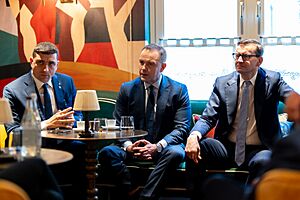
Nawrocki believes that Poland's security depends on a strong army, a close relationship with the United States, and being a key member of NATO. He supports increasing spending on the military.
He is against the idea of the European Union becoming one large, centralized state. He wants Poland to keep its own identity and power. He has also said that Germany should pay reparations for the damages caused during World War II.
Regarding the war in Ukraine, he supports a peace agreement but is against sending Polish soldiers there. He also believes it is important for Poland and Ukraine to have a partnership based on historical truth. He has strongly defended Poland's history during World War II, saying that many Poles were heroes who saved others.
Personal Life
Karol Nawrocki is married to Marta Nawrocka. She is a lawyer who works for the government. They have two children together, a son named Antoni and a daughter, Katarzyna.
They also raised Daniel, Marta's son from a previous relationship, whom Karol adopted. Daniel studies law and works as a journalist. He has also been involved in youth politics in Gdańsk.
Honours and Awards
| Country | Decoration | Date of issue | |
|---|---|---|---|
| Silver Cross of Merit | 19 October 2021 | ||
| Bronze Cross of Merit | 4 November 2016 | ||
| Pro Patria Medal | 4 August 2018 | ||
| Bene Merito honorary distinction | 9 July 2020 | ||
| Commemorative Medal of the Thirtieth Anniversary of the Establishment of the Border Guard | 29 September 2022 | ||
| Pro Bono Poloniae Medal | 4 December 2023 | ||
| Order of the White Eagle (ex officio) | 6 August 2025 | ||
| Grand Cross of the Order of Polonia Restituta (ex officio) | 6 August 2025 | ||
See also
 In Spanish: Karol Nawrocki para niños
In Spanish: Karol Nawrocki para niños
 | Aaron Henry |
 | T. R. M. Howard |
 | Jesse Jackson |





